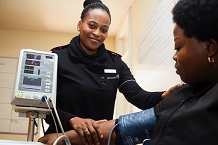
![]() Ginika Oluchi okekeHealth and Safety October 1, 2020
Ginika Oluchi okekeHealth and Safety October 1, 2020
A healthcare system that is not patient-centered is as good as dead. When it comes to effective healthcare delivery, especially in an age where technological advancement is gearing towards a zenith, patient-centered care implies a combination of timely, satisfactory and optimal care to patients.
In the healthcare marketplace, it is not debatable that patients are the consumers; therefore, focus should be on how to provide solutions that are patient oriented.
By focusing on patients, healthcare providers should ensure that patient safety and satisfaction are paramount.
In this context, patient safety is the prevention of errors and adverse effects to patients associated with health care. This is to say that, it is the prevention of harm to patients with emphasis on the system of care delivery that,
The hospital is a people-oriented place as it provides services to a plethora of patients on a 24/7 basis. The hospital atmosphere is filled with all sorts of emotions – excitement, sorrow, happiness, hopelessness and anxiety. Thus, putting the patient’s needs first goes a long way to ensuring better patient satisfaction and positive outcomes.
To experience patient-centered care, the onus is on the healthcare providers, the health system and the patients themselves to promote conducive and healthy space.
Since the hospital operates under continuous strain, it is not uncommon to witness irritation, confrontations, conflicts and aggression between hospital staff and patients.
A way to avert this is to ensure that hospital staff are not overworked, and patient numbers are not overwhelming as well.
Most of these confrontations also come from a place of frustration. Therefore, it is imperative for hospitals and patients to embrace health tech solutions that are geared towards solving the issue of overcrowding. One of such solutions is the Online Scheduling of Hospital Appointments. This will not only lessen the burden on hospital staffs, it will also make the hospital aware of patient conditions or symptoms way before the patient’s arrival.
Additionally, it never gets “too crowded” when the doctor sets his availability for consultation and the patient chooses his or her preferred time. This is especially helpful in our country, Nigeria where the regular hospital Physician-to-Patient ratio is 4 doctors to 10,000 patients and 1 nurse to 1,006 patients!
From these statistics, patient-centered care will definitely not be a topmost priority in such a system. Hospitals should integrate telemedicine service in their system to help control the crowd of patients they attend to on a daily. Patients should seek more personalized care by embracing telemedicine services as well. This way, a more personalized approach is adopted in resolving patient problems.

These will help in achieving the vision of every patient receiving safe healthcare, every time and everywhere.
Every patient deserves the right to be put first in the healthcare system. It is the responsibility of everyone to ensure that patient satisfaction and safety is the ultimate goal.
Medical Disclaimer: KompleteCare aims to improve the quality of life for everyone with fact-based content about the nature of diseases, preventive care, behavioral health conditions, treatment options and their related outcomes. We publish material that is researched, cited, edited and reviewed by licensed medical professionals. The information we provide is not intended to be a substitute for professional medical advice, diagnosis or treatment. It should not be used in place of the advice of your physician or other qualified healthcare provider.
healthcareFebruary 27, 2025
healthcareAugust 20, 2025








